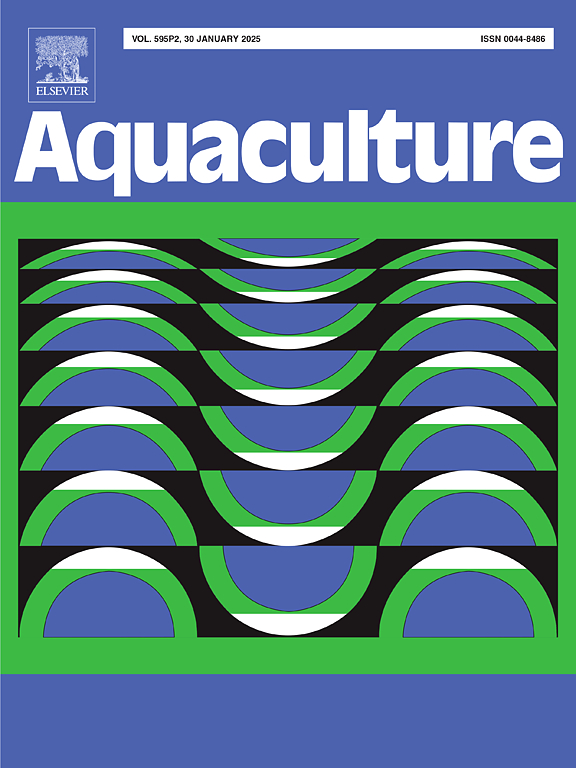Molecular insights into the immune response of Ruditapes philippinarum under Vibrio anguillarum infection at high temperature
IF 3.9
1区 农林科学
Q1 FISHERIES
引用次数: 0
Abstract
High temperatures are considered one of the major environmental factors contributing to the mass death of clams in summer, and prolonged high temperatures may increase their susceptibility to bacteria. We used the Illumina HiSeq platform to perform transcriptome sequencing on clams treated with heat stress (H), Vibrio anguillarum infection (NV), and a combination of heat stress and V. anguillarum (HV). Twelve differentially expressed genes (DEGs) related to anti-oxidation (GPx-2, GST-C, HSP70B2, HSP90), immune (Big defensin, TBK1, TRIM56, TRAF3) and apoptosis (EGR-1, BCL-3, BIRC7-a, CASP-3) were verified by real-time quantitative PCR (RT-qPCR). In addition, KEGG pathway enrichment analysis showed that, compared with the control group, the V. anguillarum infection group under high-temperature conditions exhibited significant enrichment in lysosome, autophagy, and phagosome pathway genes. The expression levels of lysosome and phagosome-related genes decreased significantly in R. philippinarum treated with high temperatures and V. anguillarum, while autophagy-related genes increased significantly. Therefore, our results suggest that long-term high temperatures inhibit the immune homeostasis regulation mechanisms mediated by the lysosomal and phagosomal pathways, while enhancing autophagy function, which may be related to the large-scale death of R. philippinarum in summer. The results of this study provide new insights into the immune response of the Manila clam under high temperature conditions when infected with V. anguillarum, offering a reference for further research into the molecular mechanisms of immune resistance in R. philippinarum.
高温被认为是导致蛤蜊在夏季大量死亡的主要环境因素之一,长期高温可能会增加蛤蜊对细菌的易感性。我们使用 Illumina HiSeq 平台对热应激(H)、鳗弧菌感染(NV)以及热应激和鳗弧菌感染(HV)处理的蛤蜊进行了转录组测序。通过实时定量 PCR(RT-qPCR)验证了与抗氧化(GPx-2、GST-C、HSP70B2、HSP90)、免疫(大防御素、TBK1、TRIM56、TRAF3)和细胞凋亡(EGR-1、BCL-3、BIRC7-a、CASP-3)相关的 12 个差异表达基因(DEGs)。此外,KEGG通路富集分析表明,与对照组相比,高温条件下的鳗鲡感染组在溶酶体、自噬和吞噬体通路基因上表现出显著的富集。经高温处理的 R. philippinarum 和 V. anguillarum 中溶酶体和吞噬体相关基因的表达水平显著下降,而自噬相关基因的表达水平显著上升。因此,我们的研究结果表明,长期高温抑制了溶酶体和吞噬体途径介导的免疫平衡调节机制,同时增强了自噬功能,这可能与夏季菲利宾纳氏菌的大规模死亡有关。该研究结果为高温条件下马尼拉蛤感染鳗鲡病毒后的免疫反应提供了新的认识,为进一步研究菲利宾纳氏蛤的免疫抗性分子机制提供了参考。
本文章由计算机程序翻译,如有差异,请以英文原文为准。
求助全文
约1分钟内获得全文
求助全文
来源期刊

Aquaculture
农林科学-海洋与淡水生物学
CiteScore
8.60
自引率
17.80%
发文量
1246
审稿时长
56 days
期刊介绍:
Aquaculture is an international journal for the exploration, improvement and management of all freshwater and marine food resources. It publishes novel and innovative research of world-wide interest on farming of aquatic organisms, which includes finfish, mollusks, crustaceans and aquatic plants for human consumption. Research on ornamentals is not a focus of the Journal. Aquaculture only publishes papers with a clear relevance to improving aquaculture practices or a potential application.
 求助内容:
求助内容: 应助结果提醒方式:
应助结果提醒方式:


